How Karl Lagerfeld turned Diet Coke into fashion's favorite accessory
Lagerfeld's desire to be stylish led to a drastic lifestyle change that prompted his embrace of diets and diet soda.
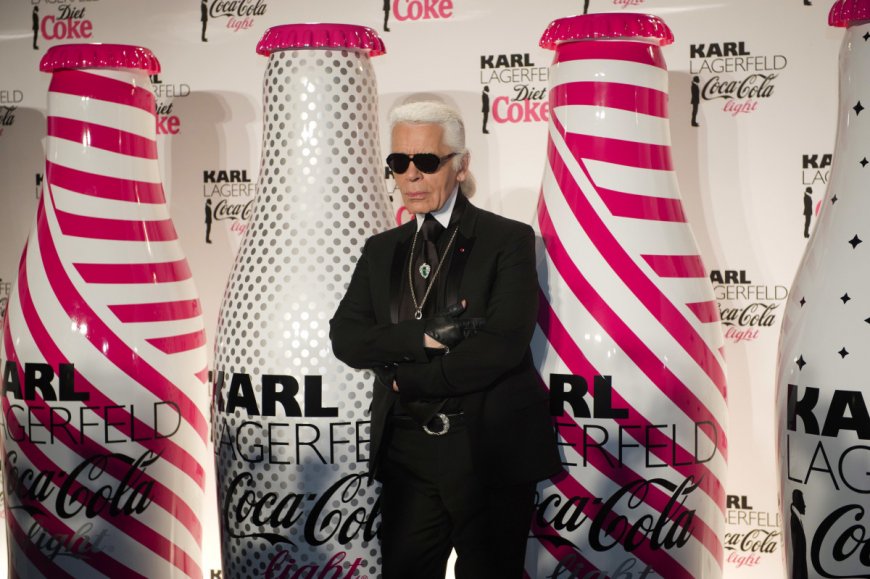
Of all the interests that my father passed on to me — such as 80’s new wave music, tennis and photography — one thing also stuck that he didn't intend to share; his love for Diet Coke.
Despite all my parents’ proactive and preventive efforts to keep their precious little kid from drinking so much soda, they inadvertently raised a soda fiend.
Related: CEO says Coke and Pepsi make a huge mistake every year
We never kept a 2-liter or cans in the fridge, but on the off chance that my parents would ignore their imposed rule I’d take advantage of their mistake in an instant.
Though soda was a no-no inside our four walls, I drank as much as I virtually could when I was outside of them.
I always found it to be a cute novelty that sit-down restaurants would give you a lemon with Diet Coke. That made it feel “fancy”, as if I was drinking some kind of crafted cocktail, but I grew to absolutely love its distinct sweet (fake-sweet) taste.
Even as an adult, soda is still a forbidden item in my parents refrigerator. 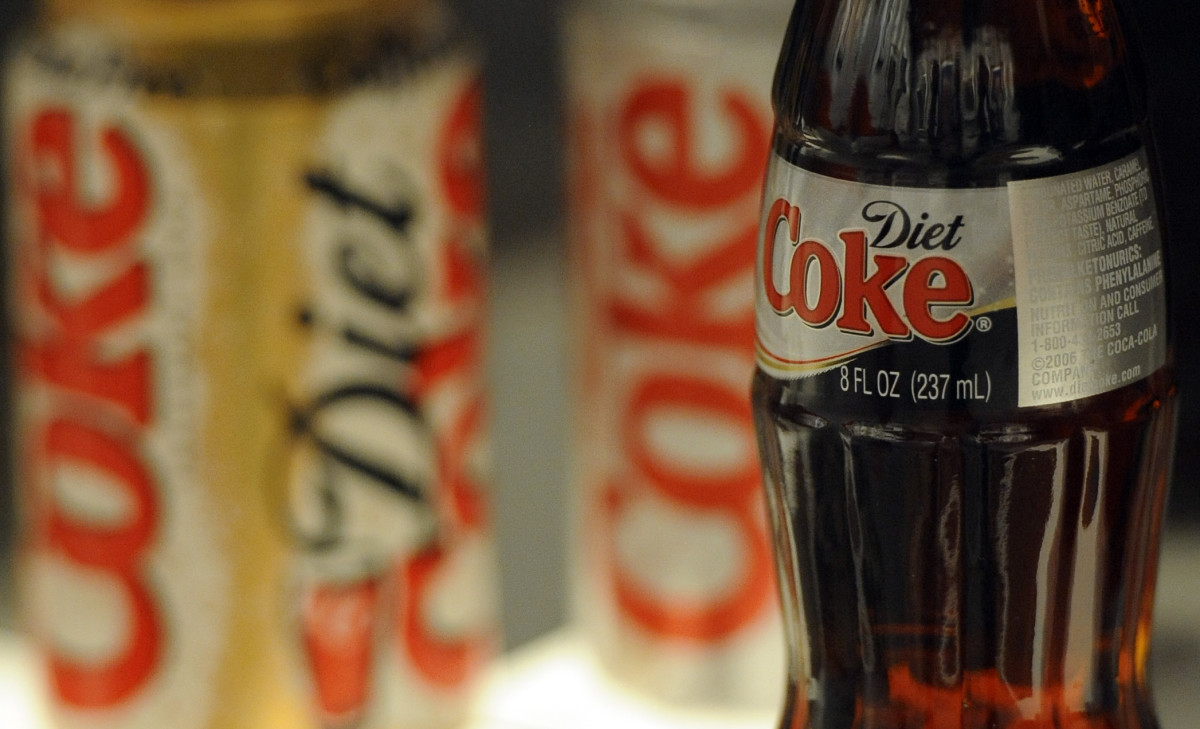
En Vogue
Whether you consider the aspartame juice in the silver can to be fancy or not, Diet Coke (KO) - Get Free Report has become a fashion accessory nonetheless.
Over its 41-year history, Diet Coke has remained a mainstay for models and on the runway, as its promise of no calories and no consequences made it the “in-thing” with the fashion crowd. 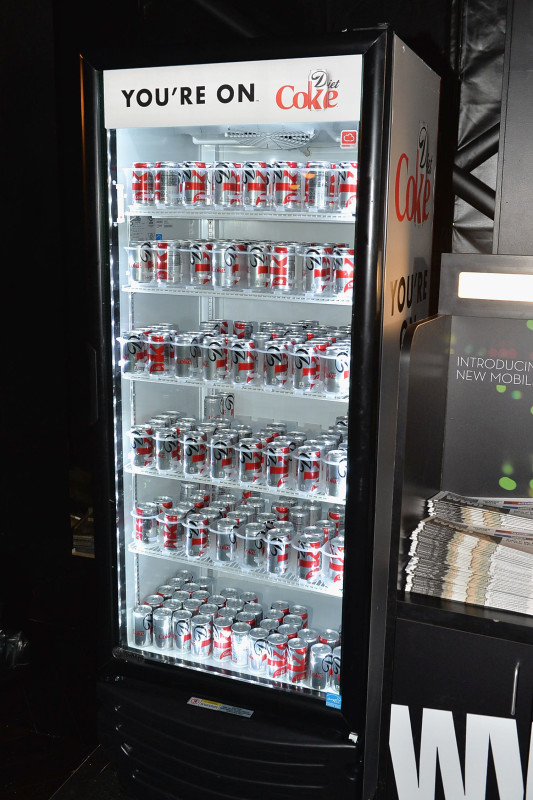
In her 2011 book "Pricing Fashion: The Making of a Fashion Model", sociologist and former fashion model Ashley Mears said Diet Coke was a common sight backstage in fashion shows as a marketing tool to tie the product with thin, fashionable models.
"I remember seeing Diet Coke backstage at most of the shows," Mears writes. "Getting products into models' hands was thought to be a great source of low-cost advertising. Anthropologists have long argued that there are no free gifts – perks and freebies are given away to specific groups of people who have the capital to reciprocate. My sense is that Diet Coke embeds itself deliberately at fashion events for this specific reason."
Another person who embraced the silver can was Karl Lagerfeld, a fashion visionary whose face I came to recognize during my formative years when my older sister watched shows like "The Fabulous Life" and "Project Runway" whenever she had control of the television.
Lagerfeld became known for his conspicuous consumption of Diet Coke, but his motives were based on more cynical ideals.
Born in Hamburg, the illustrious designer would find his way to Paris and its prestigious fashion houses. Lagerfeld’s most notable tenure would be at Chanel, where he was regarded as the designer credited with “reviving” the Chanel brand, making radical design choices and giving the fashion house an illustrious and “sexy” rebrand that its namesake once considered unorthodox.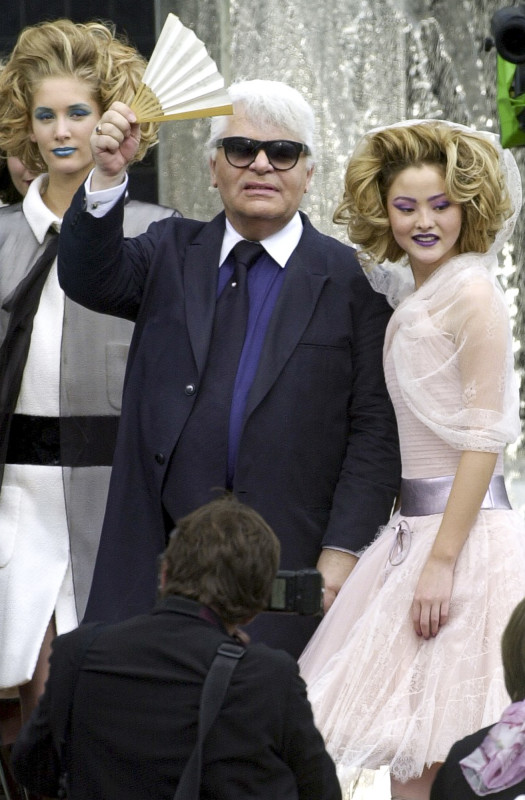
At Chanel’s haute couture show on July 13, 2000, Lagerfeld was virtually unrecognizable from the designer we knew up until his death; he was portly, dressed in a loose-fitting suit with his signature ultra-thick tie and sunglasses.
In the book he co-authored with his doctor Dr. Jean-Claude Houdret, “The Karl Lagerfeld Diet”, he said that he looked back at his former self very bluntly.
“One fine morning, I woke up and decided that I was no longer happy with my physique.”
According to the book, he began his diet on Nov. 1, 2000 and was motivated particularly by one very toxic idea.
“I had gotten along fine with being overweight and had no health problems, but I suddenly wanted to dress differently, to wear clothes designed by Hedi Slimane,” said Lagerfeld. “But these fashions, modeled by very, very slim boys (and not men of my age) would require me to lose at least 80 pounds.”
Lagerfeld would lose much more than that — exactly 92 pounds in a period of 13 months.
If you assumed that kind of weight loss would require drastic and extreme measures, you would be more than right.
Related: Decline in luxury spending has hit a major brand where it hurts
The “Karl Lagerfeld Diet” is centered around cutting fat and carbs, but mostly calories. In the first “phase” of this extreme diet, they suggest eating around 800-900 calories per day. For reference, researchers at Harvard University state that at its lowest, "calorie intake should not fall below 1,200 a day in women or 1,500 a day in men" to keep yourself out of danger.
Though Lagerfeld cut out many things in his diet, he does admit to a bit of a sweet tooth.
When asked about foods he missed the most in a Larry King interview in 2002, he said that he missed Viennese cakes. Additionally, on the subject of his dietary habits, Karl wrote in his book that he was “grateful to Coca-Cola and Pepsi-Cola for inventing diet versions,” because “without these, the picture would have been even grimmer, especially as I was addicted to Chocolate ice cream.”
It became evident that the diet cola would become an in-way for cutting out certain things.
“I drink Diet Coke from the minute I get up to the minute I go to bed,” he told Harper’s Bazaar in 2011. “I can even drink it in the middle of the night and I can sleep. I don’t drink coffee, I don’t drink tea, I drink nothing else.”
In 2010, Coca Cola Europe would appoint Lagerfeld to design limited edition bottles of Diet Coke, which sold out fast in stores across Europe.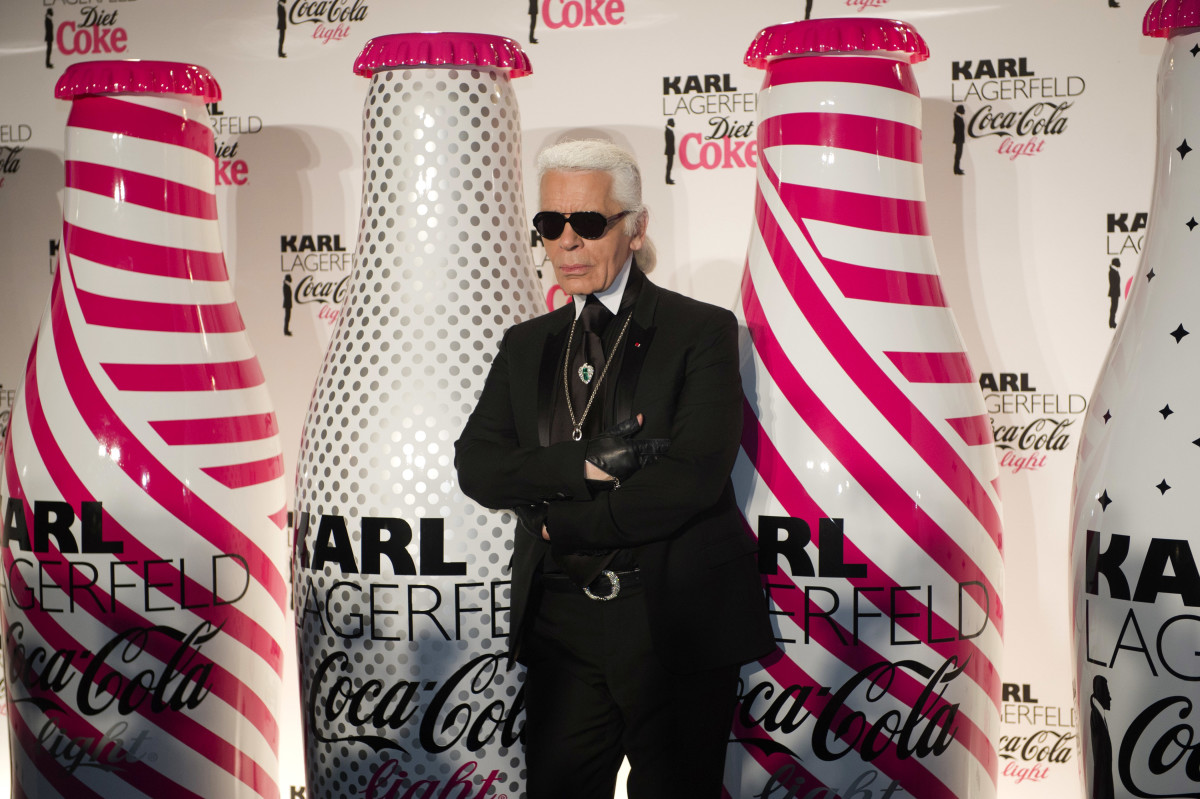
Today, Karl’s name carries enough weight to be emblazoned on department store clothes among other mass market designers like Michael Kors, Perry Ellis and Calvin Klein.
Thing is, Calvin Klein may have glamorized an unhealthy vision of perceived “sexiness” in his ads, but Calvin himself didn’t emit a vision of disgust towards the kinds of people who’d want to buy his clothes.
The same Lagerfeld who boasted about drinking ten Diet Coke’s a day is the same Lagerfeld who told a German magazine in 2009 that “no one wants to see curvy women” in reference to plus-size models and also blamed overweight people for societal woes.
“The hole in social security, it’s also [due to] all the diseases caught by people who are too fat,” he said on a French television program in 2013.
These days Diet Coke has a new face.
As part of its 40th anniversary, the silver can appointed a new creative director: supermodel and former Calvin Klein advertising star Kate Moss. Joining the likes of Lagerfeld, Jean Paul Gautier, Moschino and Roberto Cavalli with limited-edition packaging, Moss emphasized that she is honored to be a part of the family by using the diet soda’s "Love What You Love" campaign to spread a message of positivity.
“I love the past collaborations they’ve done with such incredible names in fashion. The ‘Love What You Love’ campaign connected with me instantly as I am a firm believer that with confidence and passion, you can achieve your wildest dreams,” said Moss.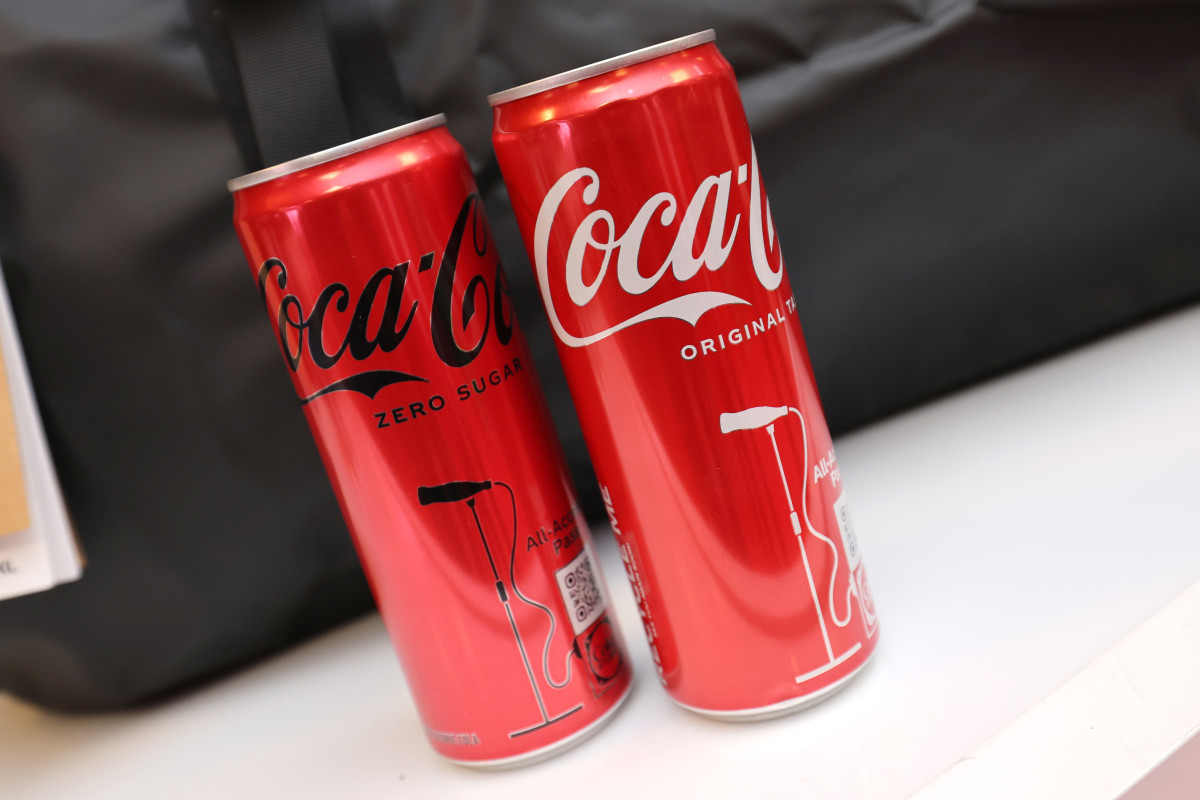
Diet Coke's (cooler) new competition
Though Diet Coke has a new face, its days as a fashion accessory may be numbered because of new products by the cola giants. Coca-Cola Zero Sugar and its Pepsi equivalent have slowly gained a foothold that its diet counterparts once held because of one important game changer: its name.
An April 2021 report by Mintel noted that “while the diet designation may be associated with strict regimes or deprivation, the ‘zero’ designation has fewer negative connotations, corresponding with simply a cleaner profile.”
Executives at big cola agree. At a conference for the beverage industry in 2021, PepsiCo North America Chief Marketing Officer Greg Lyons said that “Younger people just don’t like the word ‘diet,” and added “no Gen Z wants to be on a diet these days."
View the original article to see embedded media.
This sentiment is clear in the beverage giant's advertising. A recent ad campaign for Coke Zero Sugar is targeted straight towards said young people, featuring K-Pop superstar group NewJeans holding Coke Zero's signature red cans as if they were accessories in a fashion ad.
Coke Zero Sugar having the endorsement of a Korean pop group, whose members are the brand ambassadors for Gucci, Louis Vuitton, Christian Dior, Chanel and Burberry, sends up a flare that resonates harder than one from a fashion designer of yesteryear.
It seems like something else is en vogue and on trend these days and it isn't Diet Coke. Then again, everything off trend comes back in style sooner or later.
Related: Veteran fund manager picks favorite stocks for 2024
What's Your Reaction?



























































